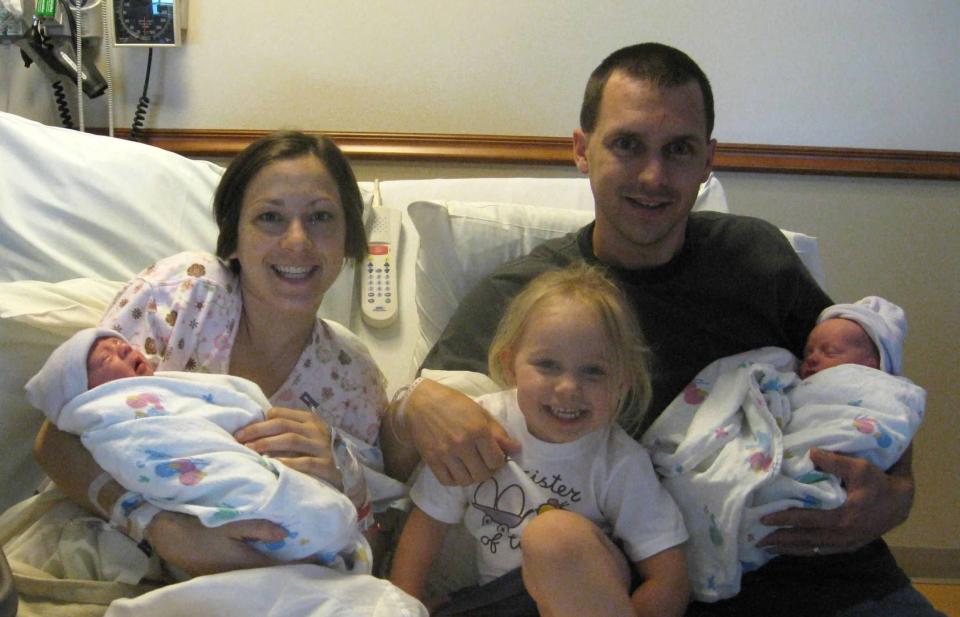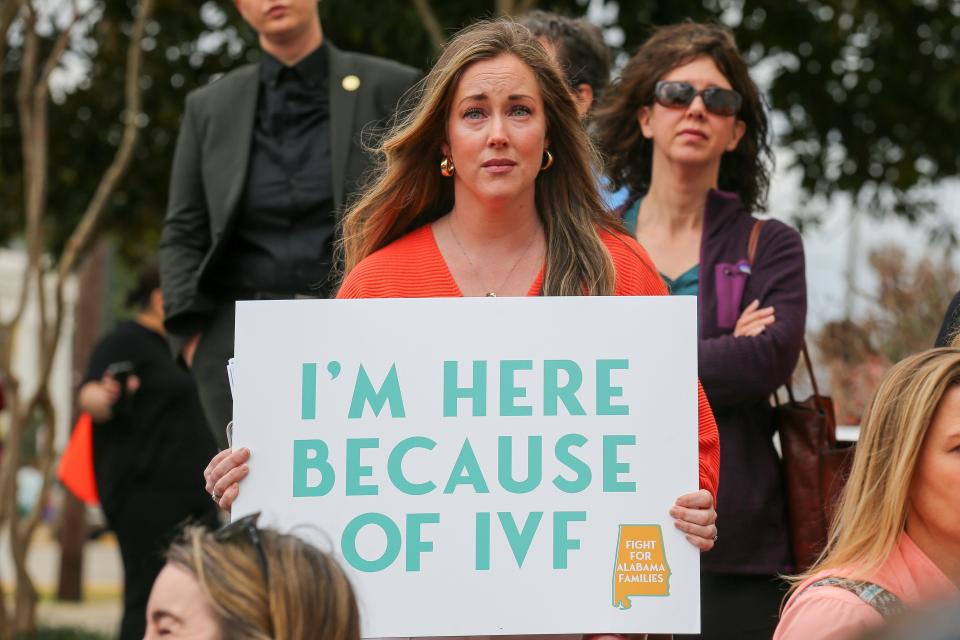Why IVF advocates worry Iowa could become the next Alabama over 'personhood' legislation
Karen Mathes says she owes "her whole being" to in vitro fertilization.
Seventeen years ago, the 41-year-old Polk City resident and her husband began IVF to start a family. An eating disorder in college meant Mathes had a suppressed ovulation cycle, prompting the couple to seek out fertility treatment at Mid-Iowa Fertility in Des Moines.
After two rounds of treatment, Mathes and her husband welcomed three children: a daughter in 2009 and twin sons in 2012.
"I owe my whole being to Dr. (Brian) Cooper and Mid-Iowa Fertility. If they weren't there, there was no way that I would have the family that I have," Mathes, who is now a nurse at Mid-Iowa Fertility, told the Des Moines Register.

“I’m not really sure of how many other jobs where you can help create life and help people basically reach their dreams of being parents," she said. "I don't really know of anything else out there that could really satisfy me as much as finding the first heartbeat for somebody's first child after they've been struggling for 5 or 10 years.”
But recent court rulings and legislation are raising fears that IVF treatments may be in jeopardy.
Shock waves swept through the industry, and throughout the rest of the country, recently after the Alabama State Supreme Court ruled that embryos created through IVF should be legally considered children. Hospitals and fertility clinics paused treatments in the days that followed.
Last week, Alabama state lawmakers gave final approval to legislation to protect IVF providers and patients from criminal and civil liability. The bill has yet to be signed into law by Alabama's governor.

The Alabama ruling has no direct impact in Iowa, but it has opened the door to questions about the possible impacts to IVF care in Iowa from providers like Mathes and Cooper, the physician at Mid-Iowa Fertility.
In particular, providers and advocates worry about the potential legal ramifications of existing Iowa law defining "unborn child" and from new legislation state lawmakers are considering that furthers the effort to define fertilized embryos as "personhood."
“We’re tampering in ground that is difficult for science to define, which makes it exceedingly more difficult for politicians to define," Cooper said.
Existing Iowa law defines fertilized embryo as 'unborn person'
Iowa Code Chapters 146A and 146B define "unborn child" as an individual organism of the species homo sapiens from fertilization to live birth.
That language was established in Iowa as part of the law that passed in 2017 establishing Iowa's current 20-week abortion ban. Under that provision, the language applies only to doctors performing abortions in Iowa.
While this existing law doesn't directly pertain to regulation of fertility care, its language has the potential to cause ramifications in Iowa similar to those that played out in Alabama, according to legal and medical experts interviewed by the Register.
Alan Ostergren, president of the Kirkwood Institute and a prominent conservative attorney, said plaintiffs in a lawsuit could use that language to argue any loss of embryos is not destruction of property, but instead a wrongful death.
As in Alabama, that distinction would be up to Iowa's courts to decide. So far, no lawsuit has set that kind of precedent, Ostergren said.
"Whether their damages would be for the destruction of their property or would have been a wrongful death claim, those plaintiffs would have to persuade the Iowa Supreme Court that the law should recognize that embryo as a child and not just an embryo," Ostergren said. "There’s not a code section right now that would directly answer that question."
Legislation Iowa lawmakers are considering this session, House File 2575, uses the same language as existing law. The bill, which was approved by the Iowa House on Thursday, would create stricter penalties for terminating a person's pregnancy without their consent. That bill is awaiting a Senate vote.
Another bill, House File 2518, uses the same "unborn person" definition to allow Iowans to bring wrongful death lawsuits over “wrongful death of an unborn child,” which would include a fertilized embryo.
Republican lawmakers are trying to tamp down fears that the same thing that happened in Alabama awaits Iowa.
"These bills were not crafted with the intention of having any effect on IVF, and they don't make any changes to IVF in Iowa," Melissa Saitz, a spokesperson for Iowa House Speaker Pat Grassley, said in a statement. "The Alabama Supreme Court has no effect on Iowa law. As always, the speaker will continue to seek feedback from Iowans on any legislative changes they would like made on this topic in the future."
More: House votes to raise penalty for killing an 'unborn person.' Democrats say it endangers IVF
What are the implications for IVF treatment?
To Cooper, the physician at Mid-Iowa Fertility, the personhood statute does not mean IVF treatments could not take place in Iowa.
However, he said it would pose huge ramifications for key pieces of that care, including genetic testing and disposing of leftover embryos.
“I think we would still be able to do some treatment, but it can significantly limit what we're able to do and take some of our most useful tools away," he said.
If fertilized embryos are defined as persons, Cooper said, it's unclear whether providers would be allowed to discard or donate frozen embryos that patients don't want to use.
To fertility care providers, perhaps the most concerning aspect are the implications for genetic testing, which clinics rely on to detect abnormalities and otherwise ensure patients are receiving healthy embryos that are more likely to result in a healthy birth.
In some cases, patients who aren't struggling to get pregnant seek out IVF treatment to ensure implanted embryos don't inherit severe genetic conditions, such as Huntington's disease. Through this method, Cooper said IVF providers have the opportunity to "virtually eliminate" deadly conditions in children.
“Who doesn’t see the positivity in that? But if you define that personhood begins at conception and I have an embryo affected, you’re telling me I’ve got to put that back? That’s where the quagmire comes in," Cooper said.
What do supporters, critics say about the 'personhood' debate?
Iowa's effort aligns with a longtime campaign nationwide by anti-abortion advocates for governments to define "fetal personhood," therefore recognizing a fetus as a person and grant them the rights and protections guaranteed to people.
Republican lawmakers dismissed concerns that the bill approved by the Iowa House would have ramifications similar to those playing out in Alabama, stating during last week's debate that existing Iowa law has not had any effect.
More: Iowa's GOP Congress members say they're both 'pro-life' and pro-IVF after Alabama ruling
Still, Democrats and other advocates have raised alarms about this effort, particularly since the U.S. Supreme Court overturned Roe v. Wade, which opened the door for states, including Iowa, to establish strict abortion laws.
Mazie Stilwell, director of public affairs for Planned Parenthood Advocates for Iowa, said the proposed legislation is a "blatant attempt" to further conservative advocates' anti-abortion agenda in the state. She argued that additional personhood language in Iowa law has the potential to create chaos within the legal system.
“The GOP has power to take away people's control over their bodies and their lives and, unfortunately, access to IVF is no different," Stilwell said.

Ostergren argued that the overturning of Roe v. Wade opened the door for legislative scrutiny of certain medical practices, including IVF and surrogacy.
"People have made a mistake if they think that they can just start fertilizing and then freezing embryos in a lab and run a business doing that and have no legal, ethical or moral scrutiny of what they're doing,” Ostergren said.
Cooper pushed back on that argument, saying IVF treatment and other fertility care is one of the most regulated fields in medicine. He also said the industry has guidelines from multiple medical regulatory bodies to ensure providers are delivering the most ethical care possible.
“They really need to understand what's already happening before you come in from the outside and try to impose something else, especially when you're not intimately familiar with what happens in our world," Cooper said. "You just end up restricting care and taking useful science away from patients that can really benefit from it.”
Mathes disagrees with the push to define fertilized embryos as people, saying that she views those embryos more as "a potential for life." Without numerous medical interventions and support, many of those don't grow beyond a bundle of cells.
Even then, she said, there isn't a guarantee a healthy birth will result.

“It scares me," she said, "It’s not so black and white. There’s a lot of gray area in the middle. It affects a lot of people, and they don’t understand that. Unless you work in it every day, you would never understand it."
Editor's note: A previously published version of this article misidentified the Kirkwood Institute, where attorney Alan Ostergren is president.
Reporter Stephen Gruber-Miller contributed to this report.
Michaela Ramm covers health care for the Des Moines Register. She can be reached at mramm@registermedia.com, at (319) 339-7354 or on Twitter at @Michaela_Ramm
This article originally appeared on Des Moines Register: IVF treatment in Iowa could be impacted by personhood legislation

